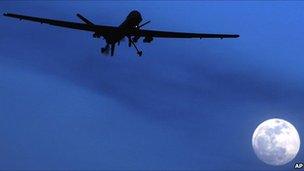Obama defends US drone strikes in Pakistan
- Published
President Obama: "They have been very precise, precision strikes against al-Qaeda and their affiliates"
US President Barack Obama has defended the use of unmanned drone aircraft to kill suspected militants in Pakistan's tribal areas.
In unusually candid remarks, Mr Obama said the strikes targeted "people who are on a list of active terrorists".
Pakistan says drone raids violate its sovereignty, although it is believed to have given them its tacit support.
The US does not routinely speak publicly about drone operations, which have killed hundreds in recent years.
The dead include senior al-Qaeda and Taliban leaders, as well as an unknown number of other militants and civilians.
Establishing precise casualty figures and identifying the dead in such attacks is virtually impossible as independent media are barred from tribal areas near the Afghan border.
Rights group Amnesty International questioned the legality of drone strikes.
Covert war
Drone warfare has been a key feature of the Obama administration's pursuit of al-Qaeda in Afghanistan and Pakistan but has rarely been discussed this openly.
Mr Obama made his comments during an hour-long video "hangout" on Google's social network, Google+, which was also streamed live on YouTube, external.
More than 130,000 questions were submitted before the hangout began, and six people were invited to join the president online for the event. They were able to ask questions and seek follow-up answers from Mr Obama.
Asked about the use of drone strikes, which have soared in number during his presidency, Mr Obama said "a lot of these strikes have been in the Fata", or Pakistan's Federally Administered Tribal Areas.
The strikes target "al-Qaeda suspects who are up in very tough terrain along the border between Afghanistan and Pakistan", Mr Obama added.
"For us to be able to get them in another way would involve probably a lot more intrusive military action than the ones we're already engaging in."
Mr Obama said drones had "not caused a huge number of civilian casualties", adding that it was "important for everybody to understand that this thing is kept on a very tight leash".
An Amnesty International statement demanded "a detailed explanation of how these strikes are lawful and what is being done to monitor civilian casualties and ensure proper accountability".
"What are the rules of engagement? While the president's confirmation of the use of drones in Pakistan is a welcome first step towards transparency, these and other questions need to be answered," the statement said.
Few details are known about the covert US drone operation, which is run by the CIA and targets al-Qaeda and Taliban militants in the mountainous areas along the Afghan-Pakistan border.
Several senior militants have been killed, as have many more lower ranking ones, correspondents say.
But so have civilians - the attacks cause outrage in Pakistan, where many assert that the strikes cause indiscriminate deaths and injuries.

In one incident last March at least 40 people were killed in North Waziristan, local officials said. Most were civilians attending a tribal meeting.
Drone attacks have fuelled anti-American feeling in Pakistan, whose relations with the US has unravelled after the US mission that killed Osama Bin Laden in 2011.
Pakistan's foreign ministry spokesman Abdul Basit responded to Mr Obama's remarks by saying: "Our position on drone strikes is clear and based on principles.
"Drone attacks are unlawful, counterproductive and hence unacceptable. We cannot condone violation of our sovereignty."
Despite Pakistan's public condemnation of drone strikes, however, the country's civilian and military leaders privately support them, according to US diplomatic cables leaked in 2010.
The Google+ event ended a week of social media engagement in the wake of Mr Obama's State of the Union address on 24 January. Obama administration officials, including Vice-President Joe Biden, held Twitter "office hours" last week.
While Mr Obama has participated in virtual town halls before on sites like Facebook and LinkedIn, the event on Monday marked his first use of the Google social site, which was launched in mid-2011.
He is not the first US politician to "hangout", however: presidential hopefuls Newt Gingrich and Mitt Romney held their own virtual events on Google in 2011.
- Published20 April 2011
- Published31 January 2012
- Published22 July 2010
- Published12 January 2012
- Published6 July 2011